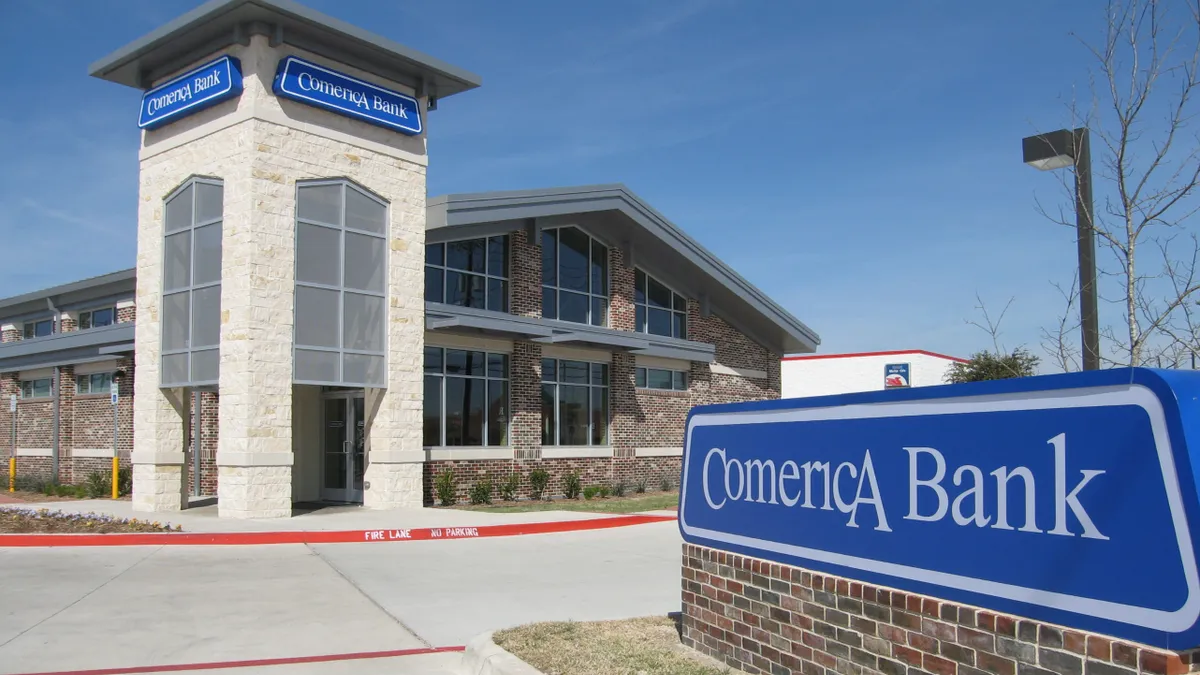The Office of the Comptroller of the Currency (OCC) plans to lay out a framework of expectations by year’s end for how large banks would manage climate risk.
Acting Comptroller Michael Hsu’s statement Wednesday put a more concrete timeline on a goal the agency mentioned last month, when the Financial Stability Oversight Council issued a report labeling climate change an “emerging threat” to the nation’s financial stability.
At the time, Hsu said the OCC hoped to issue framework guidance “in the near future.”
"I have prioritized the need to incorporate climate change into risk management frameworks to address the safety and soundness of the federal banking system," Hsu said Wednesday, adding the regulator would "accelerate" its response to the impact of climate change.
"The OCC is working to take a leadership role to understand these significant and complex challenges," Hsu added.
The agency’s commitment comes amid the backdrop of this week’s U.N. climate change summit in Glasgow — and as the Network for Greening the Financial System (NGFS), which the OCC joined in July, pledged to enhance its climate scenarios, bridge gaps in data to provide a fuller picture of climate risk and boost its efforts to support members in developing countries.
Meanwhile, New York’s Department of Financial Services (DFS) — an early NGFS member — announced Wednesday it has created a new unit to focus on integrating climate risks into its supervision of banks and other institutions. The agency's acting superintendent, Adrienne Harris, said the new Climate Risk Division "position[s] DFS at the forefront of climate-related financial supervision."
The unit aims to “develop internal capacity on climate-related financial risks,” coordinate with fellow regulators and support their capacity-building for climate-risk supervision, and ensure fair access to financial services, the agency said in a release.
The division, led by Yue “Nina” Chen — previously DFS’s director of sustainability and climate initiatives — is adding two staff members, Chen told American Banker.
“We have some of the most sophisticated insurers and banks, as well as smaller organizations that are just getting started in this journey,” she said.
DFS has served as somewhat of a standard-setter on climate. It last year became the first U.S. regulator to explicitly call on state-regulated financial institutions to integrate climate change-related financial risks into their business strategies, risk management processes and governance frameworks. Now it’s breaking out the supervision of those activities into its own silo.
Lauren Compere, managing director at Boston Common Asset Management, told American Banker that DFS’s developments Wednesday could propel other states to boost their focus on climate-related supervision.
“When you see New York and California move on something, you generally see pressure building within other states to also take action,” Compere said.
Not every U.S.-based NGFS regulator used the climate conference to springboard into an expanded climate pledge. The Federal Reserve, for one, acknowledged its limits. The central bank said Wednesday it is “committed to working within our existing mandates and authorities to address the implications of climate change, particularly the regulation and supervision of financial institutions and the stability of the broader financial system.”
However, it said, “the primary responsibility for addressing climate change itself rests with elected officials.”
Beyond climate
Regulators' flurry of action this week hasn't been limited to climate.
In another move Wednesday, New York's DFS proposed an amendment to allow the regulator to evaluate how well state-regulated banks are offering and providing credit to nonwhite- and women-owned businesses under the Community Reinvestment Act (CRA). DFS this week extended CRA requirements to nonbank mortgage lenders. The regulator in February issued guidance outlining several types of climate-related investments that banks could count toward earning CRA credit.
The public has 60 days to comment on Wednesday's proposed amendment.
The Federal Deposit Insurance Corp. (FDIC) announced Tuesday it is creating an Office of Minority and Community Development Banking, with the aim to further promote private-sector investments in low- and moderate-income (LMI) communities.
The launch comes more than a month after the regulator established its $120 million Mission-Driven Bank Fund, which facilitates investments in minority depository institutions (MDIs), community development financial institutions (CDFIs) and other mission-driven banks.
“Mission-driven banks are the financial lifeblood of their communities, enabling individuals and minority-owned small businesses to securely build savings and obtain credit," FDIC Chair Jelena McWilliams said in a statement Tuesday, adding the office will help the regulator "expand [its] engagement and collaboration in support of these institutions as part of a broader commitment to increasing financial inclusion."
Another regulator, meanwhile, spotlighted a disparity of credit disputes along racial lines.
The Consumer Financial Protection Bureau (CFPB) on Tuesday released a study analyzing data on auto loans, student loans and credit card accounts opened between 2012 and 2019, and found that consumers in majority-Black and Hispanic neighborhoods — along with younger consumers with lower credit scores — were more likely to have disputes on their credit reports.
“Error-ridden credit reports are far too prevalent and may be undermining an equitable recovery,” CFPB Director Rohit Chopra said in a statement Tuesday.
Consumers in majority-Black census tracts were more than twice as likely to have disputes on their credit reports compared to consumers in majority-white census tracts in nearly all of the categories the CFPB reviewed, the report found.
About 0.8% of auto loans in white-majority neighborhoods were given to consumers with credit disputes, compared with 2.8% of auto loans in majority-Black neighborhoods, the report found.
Meanwhile, 2.5% of credit card loans in majority-white areas went to accounts with a dispute on record, compared with 4.7% of accounts in majority black areas.
Younger consumers who opened a new auto loan were more likely to file a dispute, the report found. Researchers expressed surprise here, noting that older consumers may be more likely to possess the financial experience to file a dispute.






















